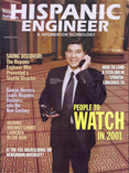The "Digital Divide" is one of the most important issues currently affecting the Latino community. Access to technology, computers, and the Internet is becoming more closely tied to economic growth and prosperity.
In order to level the playing field in the new millennium, Hispanics must erase the Digital Divide and embrace technology to close in the gap between the 'haves' and 'have-nots.' We at LULAC realize that in order to mitigate these problems, we must work together with the private sector to achieve rapid technological progress. We must accelerate the trend toward expanded access and encourage public/private partnerships to empower under-served communities.
Although Hispanic households are twice as likely to own computers now as in 1994, they are still roughly half as likely to own a computer as white households and nearly 2.5 times less likely to use the Internet. Even with all the efforts that have been made to reduce the gap, the fact remains that the disparity in access to new technologies and computer ownership continues to widen. In an Information Age society, these are dangerous precedents that the Latino community can ill afford.
Telephone penetration also deserves special attention, as it is a fundamental communications necessity. Many Latino communities still lack this basic amenity that almost all Americans take for granted. It is the first access point to new information capacities such as e-mail and high-speed Internet access. Low-income communities must have access to these advanced services if they are to improve their socioeconomic status.
We must pay close attention to corporate entities as they seek to control the Internet backbone, to guarantee that disenfranchised regions will not be cut off further from highly developed telecommunications technologies. In fact, the opposite must occur. In order for high-poverty areas to be competitive, they must be provided with such innovative facilities as Community Technology Centers that offer modern computers and training to children and adults alike. That is why LULAC has launched its Empower the Hispanic Community with Technology Project to provide Internet workstations in Hispanic communities throughout the United States. Corporations should be encouraged to donate computers and volunteer educators who are experts in advanced technology. After all, the principal obstacle to the acquisition of computers remains price.
Without access to technology, our communities will remain divided along income, ethnic, and geographic lines from white, urban/suburban families enjoying better computer and Internet access. Decision-makers must be encouraged to continue promoting policies to expand the number of community access centers and to reduce the price and accessibility of new technologies, or Latinos will fall through the net. In effect, the Digital Divide represents a modern civil rights issue.
Telecommunications technology plays a powerful role in the fostering of a more inclusive America and the ability to engage more effectively in the global market.
Rick Dovalina is president of the League of United Latin American Citizens

